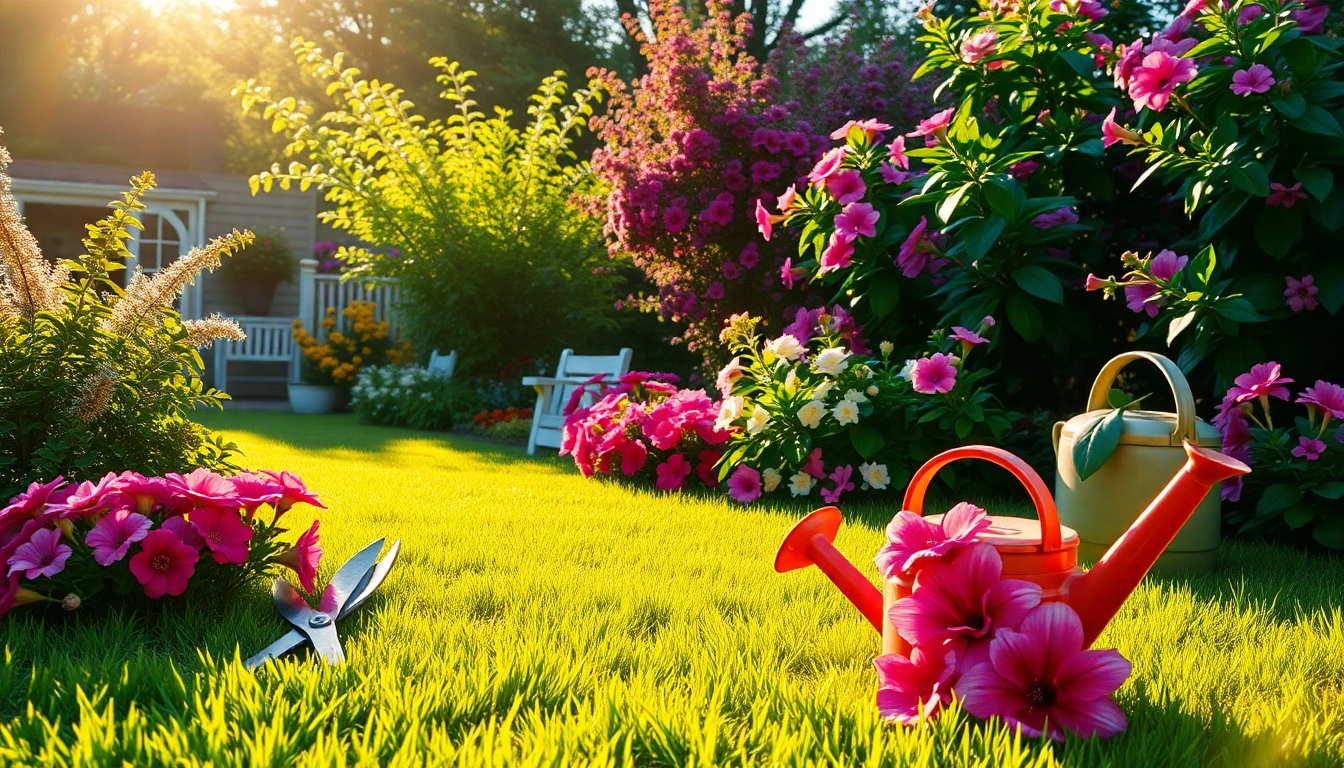Understanding Garden Maintenance Services
Maintaining a vibrant garden goes beyond simply watering plants and pulling weeds. A garden maintenance service offers an array of professional services designed to support the health and aesthetics of your outdoor space. They ensure that your garden not only flourishes but also remains a source of pride and relaxation. Whether you are a passionate gardener or a homeowner with limited time, understanding these services is crucial to making informed decisions about your garden’s care.
What Is a Garden Maintenance Service?
A garden maintenance service includes a variety of horticultural tasks aimed at keeping gardens healthy and pleasing to the eye. It often encompasses routine care for plants, flowers, trees, and shrubs, focusing on both aesthetic appeal and ecological health. Professional gardeners bring expertise and experience that can be invaluable, especially for those unfamiliar with certain gardening practices or the specific needs of various plant species.
Benefits of Professional Garden Maintenance
Engaging a professional service has multiple benefits:
- Expertise: Professionals possess knowledge of plant care, pest management, and nutritional needs.
- Time-Saving: Outsourcing these tasks allows homeowners to focus on other priorities without sacrificing garden health.
- Cost-Effective: By maintaining plants properly, they can prevent costly replacements or repairs from neglect.
- Seasonal Adaptation: Professionals understand the seasonal cycles and adjust care practices accordingly for optimal garden performance.
Common Services Offered
Garden maintenance services can vary widely, but they typically include:
- Lawn Care: Mowing, edging, aerating, and fertilizing to promote a healthy lawn.
- Plant Care: Pruning, trimming, and fertilization of trees and shrubs.
- Weed Control: Effective management of weeds through cultivation and herbicides.
- Pest and Disease Management: Monitoring for signs of pests and diseases, applying appropriate treatments.
- Seasonal Clean-Up: Preparing gardens for winter, including removing dead foliage and managing soil health.
Choosing the Right Garden Maintenance Service
Finding the right garden maintenance service entails careful consideration. Each provider may offer different specialties, pricing models, and service levels, so being informed is key for homeowners. This section will explore factors critical in selecting the best service tailored to your needs.
Factors to Consider When Hiring
When choosing a garden maintenance service, consider the following:
- Reputation: Look for companies with positive reviews and testimonials from previous clients.
- Experience: How long has the service been in operation? Experienced teams are often better equipped to handle diverse garden conditions.
- Services Offered: Does the company provide the specific services you require? Some may specialize in certain areas, such as landscape design or organic gardening.
- Customer Service: Responsive, friendly communication is crucial for a successful partnership.
- Insurance and Licensing: Ensure that the service is properly insured and licensed to perform gardening tasks in your area.
Evaluating Service Providers
To effectively evaluate potential garden maintenance providers, conduct interviews and ask specific questions:
- What is your approach to plant care and maintenance?
- Can you provide references from past clients?
- How do you handle pest control and plant diseases?
- What types of equipment do you use, and how frequently do you maintain it?
- Do you offer any guarantees on your services?
Cost Considerations for Maintenance Services
The cost of garden maintenance services can fluctuate based on numerous factors. Here are key elements that influence pricing:
- Size of the Garden: Larger spaces require more time and resources, naturally increasing costs.
- Frequency of Services: Regular, scheduled maintenance may be less expensive per visit than single, occasional services.
- Type of Services Needed: Specialized services (like landscape design or hardscaping) often carry higher costs than basic lawn care.
- Location: Prices can vary significantly based on regional demand and cost of living.
- Add-on Services: Additional treatments (e.g., tree removal, pond maintenance) will add to the base price.
Best Practices for Maintaining Your Garden
Even when employing professional services, understanding the fundamentals of garden maintenance can enhance your experience. Here are some best practices to consider:
Seasonal Maintenance Tips
Gardening varies with the seasons, each requiring different attention measures:
- Spring: Prep your garden by cleaning debris, planting new seeds, and applying fertilizers.
- Summer: Regular watering, mulching, and pest control are crucial for sustaining growth.
- Autumn: Focus on clean-up and preparing plants for winter; consider planting bulbs for spring blooms.
- Winter: Protect delicate plants, review garden layouts, and plan for the upcoming growing season.
Choosing the Right Plants for Your Area
Selecting plants that thrive in your local environment is vital for a successful garden. Consider:
- Climate: Verify if plants can endure temperature variations and weather conditions.
- Soil Type: Different plants have specific soil pH and drainage requirements—perform soil tests to assess.
- Sunlight: Understand the sunlight exposure in your garden throughout the day to select suitable varieties.
Soil Management and Fertilization
Effective soil management ensures vigorous plant growth. Strategies include:
- Soil Testing: Regularly assess your soil’s nutrient levels and pH balance for appropriate amendments.
- Organic Fertilizers: Opt for natural amendments like compost or well-rotted manure to enhance soil health sustainably.
- Crop Rotation: Alternating crops prevents nutrient depletion and reduces disease risks.
Common Challenges in Garden Maintenance
Despite careful planning, gardeners can face several challenges. Understanding these issues allows for more effective solutions.
Pest Control Solutions
Managing pests is crucial to maintaining a healthy garden. Effective strategies include:
- Integrated Pest Management (IPM): This eco-friendly approach combines biological, cultural, and chemical practices to control pests effectively.
- Natural Predators: Encouraging beneficial insects like ladybugs can help manage pest populations naturally.
- Regular Inspections: Frequent checks can detect infestations early, allowing for prompt action.
Dealing with Poor Soil Conditions
Poor soil quality can be detrimental to plant growth. To counteract this, consider the following:
- Amending Soil: Add organic material like compost to improve nutrient content and encourage microbial activity.
- Raised Beds: If soil quality is particularly low, consider building raised beds with quality soil to enhance drainage and fertility.
- Cultivating Soil: Regular tilling can help aerate compacted soil, encouraging better root growth.
Weather Impacts on Garden Growth
Weather can have profound effects on your garden. To safeguard and optimize growth, consider these tips:
- Mulching: Apply mulch to retain moisture and regulate soil temperature during heatwaves.
- Adequate Drainage: Ensure your garden has good drainage to prevent waterlogging during heavy rains.
- Protection Measures: Use row covers or greenhouses during extreme weather to protect tender plants.
The Future of Garden Maintenance Services
The gardening industry is evolving, influenced by technological advancements and changing societal values. This section discusses emerging trends and innovations that shape the future of garden maintenance services.
Technological Innovations in Gardening
From smart watering systems to drone technology, innovations are transforming gardening:
- Smart Irrigation: Automated systems can optimize water usage based on real-time weather data.
- Garden Monitoring Devices: Sensors can monitor soil moisture levels and plant health, providing data to gardeners at their fingertips.
- Robotic Mowers: These devices can automate lawn care, providing convenience for busy homeowners.
Sustainable Practices in Garden Care
As environmental concern grows, sustainable gardening practices are becoming increasingly vital:
- Organic Gardening: Avoiding chemical pesticides and fertilizers promotes a healthier ecosystem.
- Permaculture: This design philosophy emphasizes coexistence with natural ecosystems to foster sustainability.
- Native Plant Usage: Emphasizing local flora can result in lower maintenance and support local wildlife.
Community Trends and Gardening
The gardening community is growing, with a strong focus on sharing knowledge and resources:
- Community Gardens: These shared spaces not only provide accessibility to gardening but also foster community relationships.
- Workshops and Education: Many gardening services and organizations are offering workshops to educate enthusiasts on best practices.
- Online Communities: Social media groups and forums facilitate connections among gardeners, allowing the exchange of tips and experiences.



